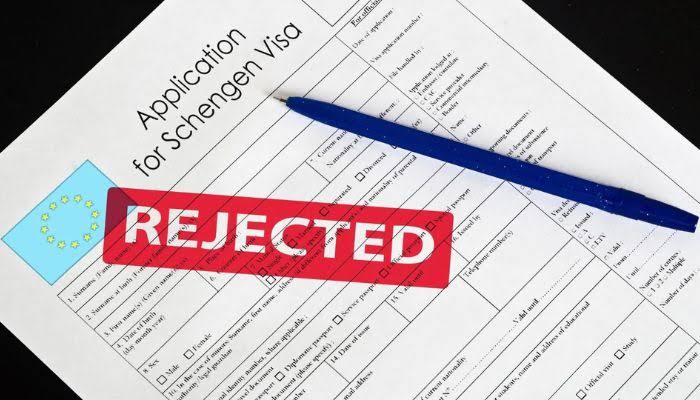In a recent report by Henley and Partners that ranked the 10 countries globally with the highest Schengen visa rejection rates, it was noted that “Africa accounted for seven of the top ten countries with the highest Schengen visa rejection rates in 2022.”
The report states that there was a significant decrease in the total number of Schengen visa applications worldwide, dropping from 16.7 million in 2014 to 7.6 million in 2022.
This decline amounted to a reduction of almost 9 million applications, which equates to a decrease of approximately 54.7% in the global number of Schengen visa applications.

However, “African visa applicants face more severe restrictions compared to applicants from other regions, resulting in a disproportionately high rejection rate.
In 2022, Africa topped the list of rejections with 30% or one in three of all processed applications being turned down, even though it had the lowest number of visa applications per capita,” the report adds.
Some Africans from specific regions face visa rejections when attempting to travel for leisure, education, or other reasons. Being denied entry into a foreign region can create feelings of isolation.
This restriction on travel not only limits the growth potential of African businesses but also reinforces a reliance on domestic markets.Entrepreneurs are significantly impacted by visa rejections.
These hard-working individuals, depending on their birth region, may find their business growth hindered due to the inability to expand beyond their borders.
Here are the top five African countries with the highest Schengen visa rejection rates, along with their respective rejection rates:- Algeria: 45.8% rejection rate, with 392,053 applications and 179,409 rejections.- Guinea-Bissau: 45.2% rejection rate, with 7,990 applications and 3,611 rejections.- Nigeria: 45.1% rejection rate, with 86,815 applications and 39,189 rejections.- Ghana: 43.6% rejection rate, with 42,124 applications and 18,363 rejections.- Senegal: 41.6% rejection rate, with 56,866 applications and 23,683 rejections.
Additionally, Guinea and Mali are also listed with rejection rates of 40.6% and 39.9% respectively.
Governments need to make concentrated efforts to encourage visa liberalization, simplify application procedures, and address discriminatory practices.
























































![[FREE FREE MONEY] Predict and Win a Guaranteed GH¢200 From Us EVERY WEEK](https://wordpress.ghanatalksradio.com/wp-content/uploads/2022/02/Predict-and-Win-Final-09-03-2021-218x150.jpg)
![[Predict & Win – 8th/Oct.] WIN A Guaranteed ¢200 From Us This Week](https://wordpress.ghanatalksradio.com/wp-content/uploads/2021/10/maxresdefault-16-218x150.jpg)
![[Predict & Win – 2nd] WIN A Guaranteed ¢200 From Us This Week](https://wordpress.ghanatalksradio.com/wp-content/uploads/2021/09/maxresdefault-50-218x150.jpg)
![[Predict & Win – 25th] WIN A Guaranteed ¢200 From Us This Week](https://wordpress.ghanatalksradio.com/wp-content/uploads/2021/09/maxresdefault-36-218x150.jpg)
![[Predict & Win – 18th] WIN A Guaranteed ¢200 From Us This Week](https://wordpress.ghanatalksradio.com/wp-content/uploads/2021/09/maxresdefault-23-218x150.jpg)







![[National cathedral] See full list of churches that have contributed since 2018](https://wordpress.ghanatalksradio.com/wp-content/uploads/2020/09/Ghana-National-Cathedral-GhanaTalksRadio-100x70.jpg)



